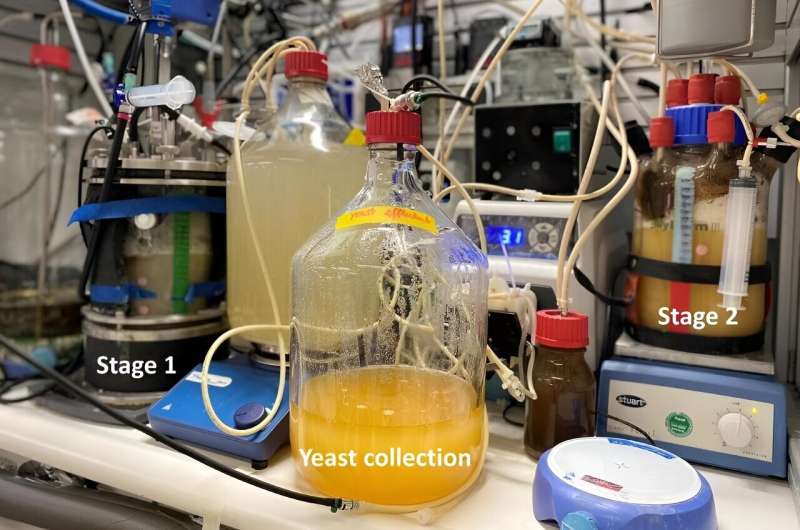
Test Run Credit: Lisa Schmitz
German researchers can extract protein and vitamin B9 from microbes by feeding them nothing more than hydrogen, oxygen, and CO.2. The technology was published on September 12 in the journal Trends in Biotechnologyworks with renewable energy to produce a sustainable, micronutrient-enriched protein alternative that may one day end up on our plates.
“It’s a fermentation process similar to the way we make beer, but instead of giving the microbes sugar, we gave them gas and acetate,” says lead author Largus Angenent from the University of Tübingen, Germany. We knew that yeast could produce vitamin B9 with sugar alone, but we didn’t know if they could do the same with acetate.
“We are approaching 10 billion people in the world, and with climate change and limited earth resources, it will become harder and harder to produce enough food,” says Angenent. “An alternative is to grow proteins in bioreactors through biotechnology instead of growing crops to feed animals. This makes farming much more efficient.”
The team designed a two-stage bioreactor system that produces yeast rich in protein and vitamin B9. This vitamin is also known as folate and is essential for body functions such as cell growth and metabolism. In the first step, the bacterium Thermoanaerobacter kivui converts hydrogen and CO2 to acetate found in vinegar.
In the second stage, Saccharomyces cerevisiae, better known as baker’s yeast, feeds on acetate and oxygen to make protein and vitamin B9. For example, hydrogen and oxygen can be produced using water with electricity generated by clean energy sources such as windmills.
Acetate-fed yeasts seem to produce about the same amount of vitamin B9 as they consume sugar. Just 6 grams or 0.4 tablespoons of harvested dry yeast meets the daily requirement of vitamin B9. Vitamin levels were measured by a team led by co-author Michael Richlik at the Technical University of Munich in Germany.
For protein, the researchers found that their yeast levels were higher than beef, pork, fish and lentils. Eighty-five grams or 6 tablespoons of yeast provides 61 percent of the daily protein requirement, while beef, pork, fish, and lentils provide 34, 25, 38, and 38 percent of the daily requirement, respectively.
However, yeast must be treated to remove compounds that can increase the risk of gout if consumed in excess. However, treated yeast still provides 41% of the daily protein requirement, which is comparable to traditional protein sources.
This technology aims to address several global challenges: environmental protection, food security and public health. Working with clean energy and CO2This system reduces carbon emissions in food production. It separates land use from agriculture and frees up space for conservation.
Agenent also emphasizes that it will not take advantage of farmers. Instead, the technology helps farmers focus on growing vegetables and crops sustainably. The team’s yeast may also help developing countries overcome food shortages and nutritional deficiencies by providing protein and vitamin B9.
But before you find the research team’s yeast in the grocery aisle as a protein replacement, Angenent says there’s more work to be done. They plan to optimize and increase production, review food safety, perform technical and economic analysis, and gauge market interest.
“The fact that we can make vitamins and proteins at the same time at very high production rates without using land is exciting,” says Angenent. “The final product is vegetarian/vegan, non-GMO and sustainable, which can appeal to consumers.”
More information:
Power to vitamin: production of folate (vitamin B9) from renewable electrical energy and CO2 with microbial protein system, Trends in Biotechnology (2024). DOI: 10.1016/j.tibtech.2024.06.014
quote: Renewable-powered microbes turn CO2 into protein and vitamins (2024, September 12) Retrieved September 12, 2024, from https://phys.org/news/2024-09-powered-renewable-energy-microbes-protein .html
This document is subject to copyright. Except for any fair dealing for the purpose of private study or research, no part may be reproduced without written permission. Content is provided for informational purposes only.
#Microbes #convert #CO2 #protein #vitamins #renewable #energy